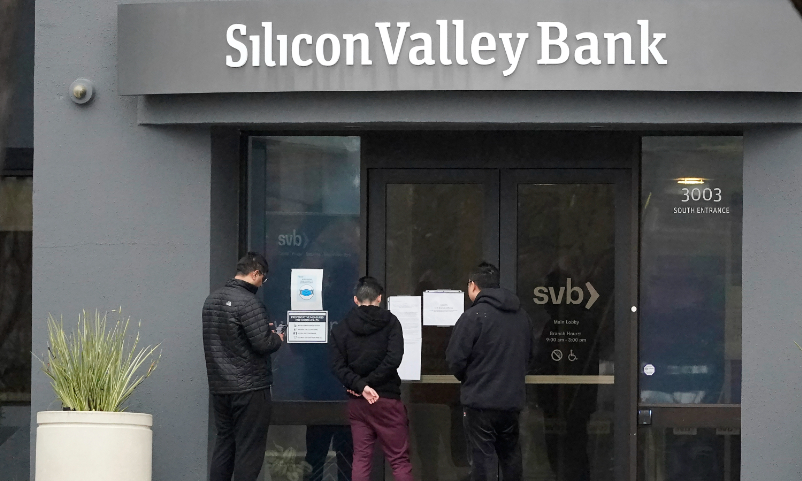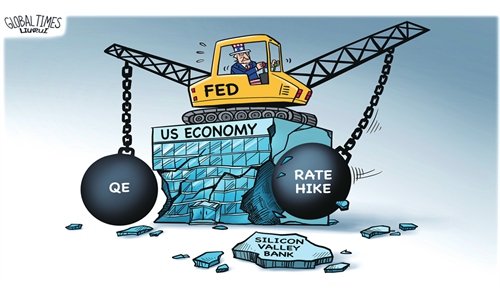China urges US to explain seriousness of bank crisis, as Fed’s rate hike raises risks

People look at signs posted outside of an entrance to Silicon Valley Bank in Santa Clara, California, on March 10, 2023. Photo: VCG
China's Foreign Ministry on Thursday urged the US to explain to the world how serious the risk of the US banking crisis is, and how the US authorities plan to deal with it and minimize its spillover effects, as it's the US' responsibility and expectations of the international community.
"As the world financial system is highly related, the US banking problems affect not only the US itself but the world as a whole. The Silicon Valley Bank (SVB) incident has triggered global financial market volatility," Chinese Foreign Ministry spokesperson Wang Wenbin said at a regular press briefing on Thursday.
As the dollar is an international currency, US monetary policies should not only consider the US' domestic economic targets but should also prudently evaluate its negative spillover effects, Wang said.
"We urge the US to take responsible macroeconomic policies to earnestly stabilize markets and investors' confidence, and avoid negative spillovers from its aggressive policies and a repeat of the 2008 financial crisis," he said, noting that financial regulators in relevant countries should take measures to protect the security of the deposits of customers from all countries.
The remarks came as the prospect of a deepening banking crisis in the US was not effectively defused, as a total of 186 US banks have reportedly been exposed to risks similar to SVB.
Despite mounting stress in the country's banking sector, the Fed raised its key short-term interest rate by 0.25 percentage points on Wednesday, marking its ninth consecutive hike since March 2022.
Unlike the Fed's previous narrative that "ongoing increases… will be appropriate," it said on Wednesday that "additional policy firming may be appropriate" so as to lower inflation to its 2 percent target, signaling that it's close to winding down the hiking cycle.
The Fed stressed in the statement that the US banking system is sound and resilient, as Wall Street urges a pause in rate hikes amid mounting stress in the banking sector.
Experts said the Fed's move was within expectations as it couldn't afford to make wrong moves again after it led to US economic overheating with ultra-loose monetary policy three years ago.
"A mild interest rate rise is a result of gaming between the Fed and Wall Street, as the Fed's top priority is to bring down high inflation," Tian Yun, an independent analyst, told the Global Times.
Tian projected that the Fed may continue to lift interest rates to at least around 5.5 percent to tame high inflation.
In February, the US CPI remained high despite aggressive rate hikes, with the annual inflation rate at 6 percent.
"Whether raising interest rates or not, the stakes are high at a critical moment of attempting to stabilize the US banking system, while achieving a soft landing," Dong Shaopeng, a senior research fellow at the Chongyang Institute for Financial Studies at Renmin University of China, told the Global Times.
Following the Fed's announcement, US regional bank stocks ended lower, with PacWest Bancorp sliding 17.1 percent. The bank said in a statement on Wednesday its deposits had fallen to $27.1 billion by Monday, a loss of about 20 percent since the start of this year. It said that it had secured cash by raising $1.4 billion via a lending facility.
The US seems to be flooding the market with more dollars again with a new tool called the Bank Term Funding Program, as the US Department of the Treasury has agreed to provide up to $25 billion in credit protection, Yang Delong, former chief economist at Shenzhen-based First Seafront Fund Management Co, said in a note sent to the Global Times on Thursday.
Experts said that risks persist in the US banking sector if the US authorities don't solve its internal problems from the roots. Looser restrictions and a growing emphasis on markets and profits may mean a larger crisis is still on the way, according to Tian.
However, the Western bank crisis will likely have limited impact on China's banking sector or its economy, as a strong Chinese economic rebound as well as its responsible and independent monetary policies will help the country overcome external disturbances, they said.
China's stock market was stable, with the benchmark Shanghai Composite Index gaining 0.64 percent to 3,286.65 on Thursday, and the Shenzhen Component up 0.94 percent to 11,605.29.
China will cut the reserve requirement ratio by 0.25 percentage points for financial institutions starting from Monday, which is expected to inject 500 billion yuan ($72.6 billion) worth of liquidity into the market to bolster the economic growth momentum after investment stabilized and consumption rebounded in the first two months of the year.
Meanwhile, China is willing to work with other economies to strengthen macroeconomic policy coordination to jointly maintain international financial stability, Wang said on Thursday.



